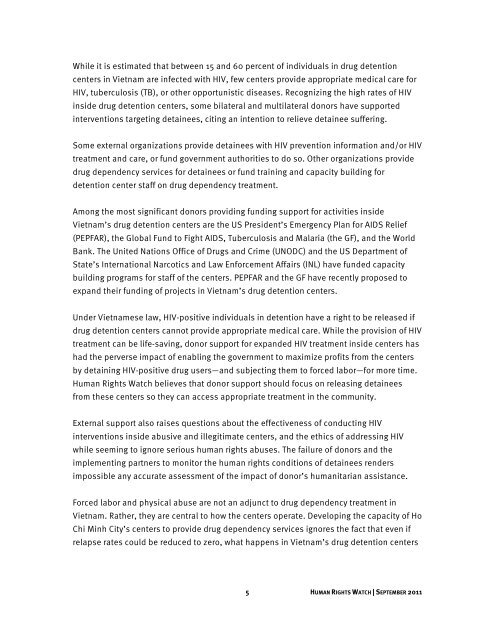The Rehab Archipelago - Human Rights Watch
The Rehab Archipelago - Human Rights Watch
The Rehab Archipelago - Human Rights Watch
You also want an ePaper? Increase the reach of your titles
YUMPU automatically turns print PDFs into web optimized ePapers that Google loves.
While it is estimated that between 15 and 60 percent of individuals in drug detention<br />
centers in Vietnam are infected with HIV, few centers provide appropriate medical care for<br />
HIV, tuberculosis (TB), or other opportunistic diseases. Recognizing the high rates of HIV<br />
inside drug detention centers, some bilateral and multilateral donors have supported<br />
interventions targeting detainees, citing an intention to relieve detainee suffering.<br />
Some external organizations provide detainees with HIV prevention information and/or HIV<br />
treatment and care, or fund government authorities to do so. Other organizations provide<br />
drug dependency services for detainees or fund training and capacity building for<br />
detention center staff on drug dependency treatment.<br />
Among the most significant donors providing funding support for activities inside<br />
Vietnam’s drug detention centers are the US President’s Emergency Plan for AIDS Relief<br />
(PEPFAR), the Global Fund to Fight AIDS, Tuberculosis and Malaria (the GF), and the World<br />
Bank. <strong>The</strong> United Nations Office of Drugs and Crime (UNODC) and the US Department of<br />
State’s International Narcotics and Law Enforcement Affairs (INL) have funded capacity<br />
building programs for staff of the centers. PEPFAR and the GF have recently proposed to<br />
expand their funding of projects in Vietnam’s drug detention centers.<br />
Under Vietnamese law, HIV-positive individuals in detention have a right to be released if<br />
drug detention centers cannot provide appropriate medical care. While the provision of HIV<br />
treatment can be life-saving, donor support for expanded HIV treatment inside centers has<br />
had the perverse impact of enabling the government to maximize profits from the centers<br />
by detaining HIV-positive drug users—and subjecting them to forced labor—for more time.<br />
<strong>Human</strong> <strong>Rights</strong> <strong>Watch</strong> believes that donor support should focus on releasing detainees<br />
from these centers so they can access appropriate treatment in the community.<br />
External support also raises questions about the effectiveness of conducting HIV<br />
interventions inside abusive and illegitimate centers, and the ethics of addressing HIV<br />
while seeming to ignore serious human rights abuses. <strong>The</strong> failure of donors and the<br />
implementing partners to monitor the human rights conditions of detainees renders<br />
impossible any accurate assessment of the impact of donor’s humanitarian assistance.<br />
Forced labor and physical abuse are not an adjunct to drug dependency treatment in<br />
Vietnam. Rather, they are central to how the centers operate. Developing the capacity of Ho<br />
Chi Minh City’s centers to provide drug dependency services ignores the fact that even if<br />
relapse rates could be reduced to zero, what happens in Vietnam’s drug detention centers<br />
5 HUMAN RIGHTS WATCH | SEPTEMBER 2011

















